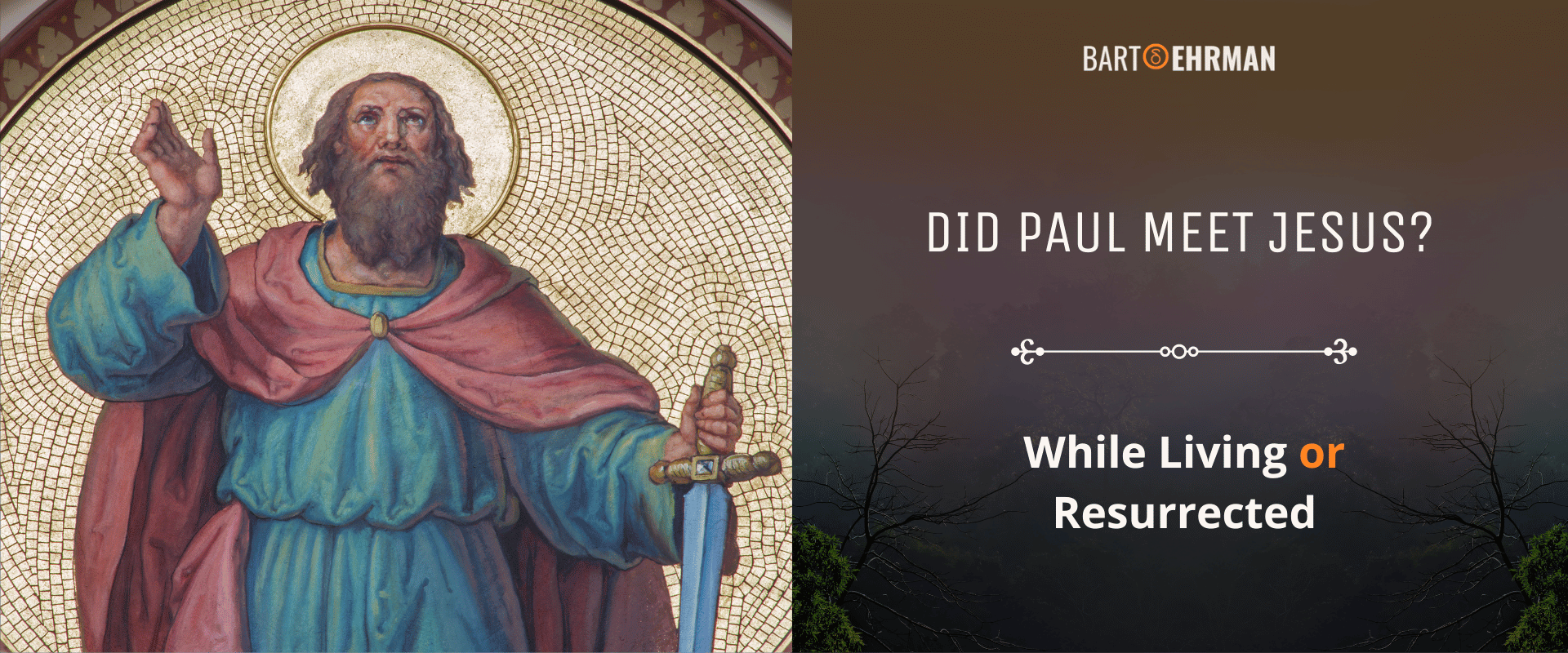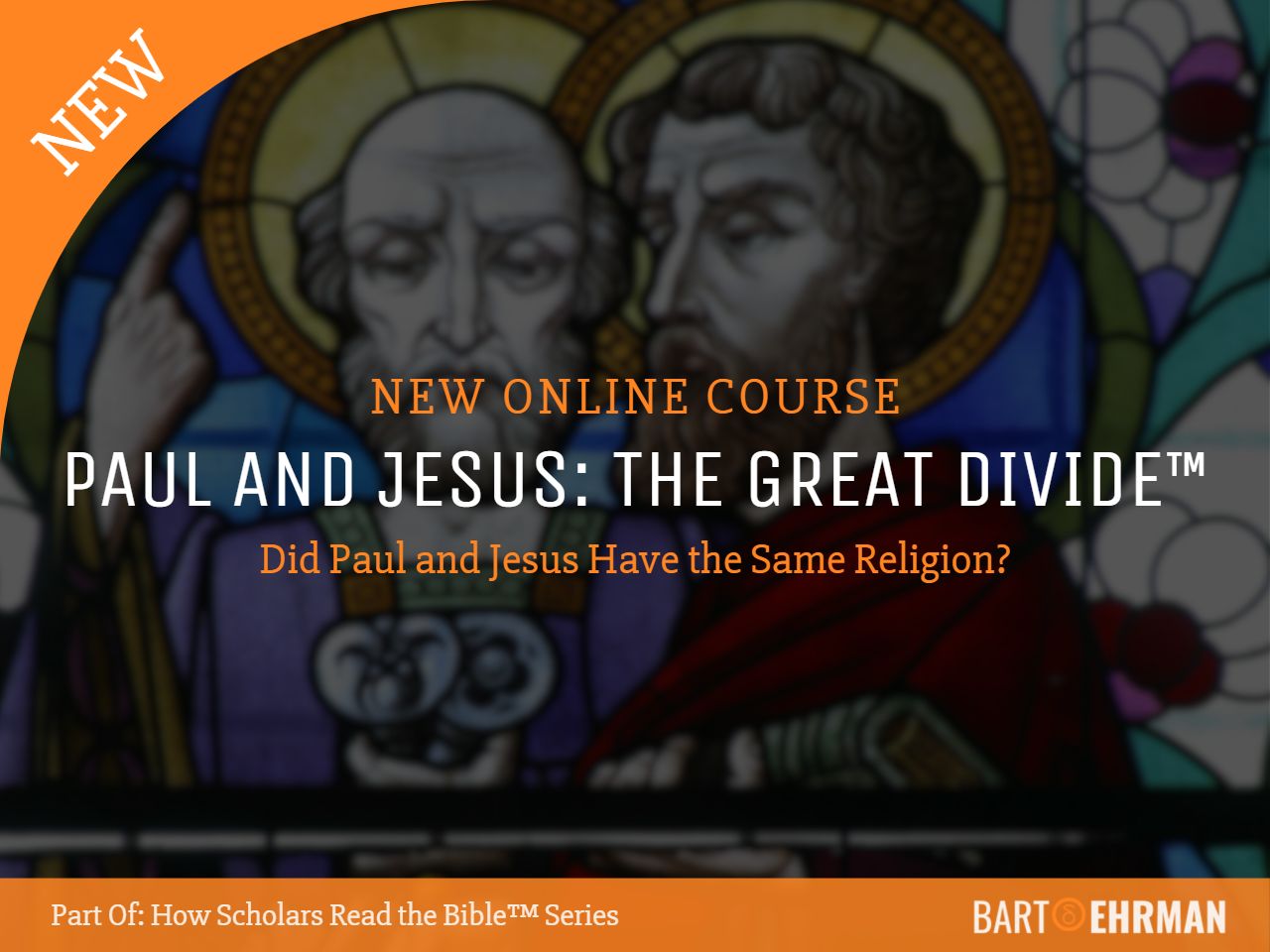Did Paul Meet Jesus? (While Living or Resurrected)

Written by Joshua Schachterle, Ph.D
Author | Professor | Scholar
Author | Professor | BE Contributor
Verified! See our editorial guidelines
Verified! See our guidelines
Date written: April 19th, 2024
Disclaimer: The views and opinions expressed in this article belong to the author and do not necessarily match my own. - Dr. Bart D. Ehrman
After his conversion, the Apostle Paul’s life centered around Jesus, whom he believed to be the Messiah. But did Paul meet Jesus? This question is more complicated than it may appear. For in Paul’s view, there were two phases of Jesus’ life. In the first phase, Jesus was a 1st-century Galilean preacher who was crucified by Roman authorities.
One question, then, is whether Paul met this earthly Jesus. The second, though, concerns the resurrected Jesus whom Paul believed to have conquered sin and death and been raised up to heaven, later appearing to a number of people. Was Paul one of these people? Did Paul see Jesus after his resurrection? Let’s delve into these two questions.

Would It Have Been Possible for Paul to Meet Jesus? (Did They Live at the Same Time?)
In order to determine whether Paul met Jesus before the crucifixion, we have to start with a simple question: Did Paul and Jesus live at the same time?
While none of our sources talks directly about Paul’s birth, L. Michael White and the scholarly consensus say that he was born between 5 BCE and 5 CE. In addition, Raymond Brown notes that Paul was executed near the end of Nero’s reign, probably in 67 or 68 CE.
Most scholars place Jesus’ birth, on the other hand, between 6 and 4 BCE, at the end of the life and reign of Herod the Great, according to Geza Vermes. Paul Rhodes Eddy and Gregory A. Boyd agree with the scholarly consensus that Jesus’ death occurred between 30 and 33 CE.
This tells us that Jesus and Paul definitely lived at the same time. But did they live in the same place?
Did Jesus and Paul Live in the Same Place?
Although the Gospels of Matthew and Luke say that Jesus was born in the city of Bethlehem, scholarly consensus agrees that it’s much more likely that he was born in Nazareth, which Mark 6:1 calls his hometown (Greek: patrida).
This also places Jesus in the northern Palestinian region of Galilee. The Synoptic Gospels are clear that Jesus spent the vast majority of his life and ministry in Galilee. As a Galilean Jew, Jesus probably spoke only Aramaic, as did his Galilean disciples.
The book of Acts says that Paul, on the other hand, was born in the city of Tarsus in the region of Cilicia (modern-day Turkey). Although Paul never says he was born in Tarsus in his letters, scholars find no reason to doubt it. After all, Paul was clearly a Greek-speaking Jew – writing all his letters in Greek – and Greek was the primary language in Cilicia.
But Acts 22:3 also has Paul announce that although he was born in Tarsus, he was raised in Jerusalem and educated by the famous rabbi Gamaliel. Couldn’t he have met Jesus there?
I noted in another article that the book of Acts is not always historically reliable. Its portrayal of Paul, for example, frequently contradicts Paul’s own words from his letters. Since Paul never mentions being raised in Jerusalem or being educated by Gamaliel – both of which would have given him added credibility with the communities to whom he wrote his letters – most scholars dismiss this as a literary invention by the author of Luke-Acts.
So, we’ve established that Paul and Jesus were indeed contemporaries. Although they were Jews of roughly the same age, they were born and raised far from each other. An actual meeting between the two would have required Paul to travel to Palestine since Jesus apparently never left. Could this have happened before the crucifixion?
The book of Acts, which again is historically suspect, also says that Paul started out by persecuting Christians in Jerusalem before his conversion. If he was in Jerusalem then, couldn’t he have been there for several years and thus have met Jesus?
It turns out that Paul’s own letters make it seem doubtful that he was persecuting Christians in Jerusalem before his conversion. Bart Ehrman points out, for example, that in Galatians 1:22, Paul says that he “was still unknown by sight to the churches of Judea that are in Christ.” In other words, members of the church in Jerusalem had never seen him before.
This suggests that he had never been among them, which also suggests that he was persecuting Christians in other regions, not Jerusalem or anywhere else in Judea. But where was Paul when Jesus was being crucified?
It seems strange, given how widely-known Jesus is now, but he was relatively unknown before his crucifixion. This is not to say that he didn’t have followers; he clearly did. But it’s unlikely that anyone outside of Palestine had heard of him before stories about his resurrection started to circulate.
So the most likely answer is that Paul was still in Tarsus, his hometown, when Jesus was being crucified. He was probably unaware of Jesus until he discovered the post-resurrection movement based on him, a movement whose identification of a crucified criminal as Messiah infuriated him and made him want to persecute its members.
All this evidence, added to the fact that Paul never claims in his letters to have met the earthly Jesus, makes one conclusion inevitable: Jesus and Paul never met during Jesus’ earthly life.
What Does Paul Write About Meeting Jesus?
Since Paul never even claims to have met the earthly Jesus, we have to examine what he says about encountering the resurrected Jesus. His entire life after post-conversion, was devoted to the resurrected Christ. But what actually happened during this encounter? Did he actually see and/or hear Jesus?
Most scholars agree with Paul Barnett that Paul’s conversion experience took place 3-7 years after the death of Jesus, placing it between 33 and 37 CE.
The best-known Bible verse of Paul’s encounter with Jesus is Acts 9:1-9. It’s worth looking at the whole thing here:
Meanwhile Saul, still breathing threats and murder against the disciples of the Lord, went to the high priest and asked him for letters to the synagogues at Damascus, so that if he found any who belonged to the Way, men or women, he might bring them bound to Jerusalem. Now as he was going along and approaching Damascus, suddenly a light from heaven flashed around him. He fell to the ground and heard a voice saying to him, “Saul, Saul, why do you persecute me?” He asked, “Who are you, Lord?” The reply came, “I am Jesus, whom you are persecuting. But get up and enter the city, and you will be told what you are to do.” The men who were traveling with him stood speechless because they heard the voice but saw no one. Saul got up from the ground, and though his eyes were open, he could see nothing; so they led him by the hand and brought him into Damascus. For three days he was without sight and neither ate nor drank.
This is a very dramatic scene and has inspired many famous paintings, such as The Conversion of Saint Paul by Caravaggio. The scene is related twice more by Paul himself in the book of Acts with some minor details changed (see Acts 22:1–21 and 26:9–23). However, the major elements of a blinding light and the voice of Jesus are common to all three.
So according to Acts, Paul definitely met the risen Jesus. But what does Paul say in his letters about his own conversion experience? Does it match the scene in Acts?
In 1 Corinthians 15:3-9, Paul writes about appearances of the resurrected Jesus to others, including Peter, the disciples, 500 other Christians at one time, James the brother of Jesus, and finally the apostles (presumably different from the disciples). At the end of this list, he writes “Last of all, as to one untimely born, he appeared also to me. For I am the least of the apostles, unfit to be called an apostle, because I persecuted the church of God.”
Note that he says “last of all,” indicating that Jesus’ appearance to him was the last to occur. Rabbi Shira Lander notes that the Greek word translated as “untimely born” actually refers to a stillbirth. In other words, Paul refers to his time persecuting the church as a time when he was (metaphorically) dead, while his encounter with the resurrected Jesus brought him to life.
This passage speaks broadly of an appearance of the risen Jesus to Paul, but doesn’t give us a lot of detail about that experience. A passage in 2 Corinthians gives us a bit more information.
In 2 Corinthians 12:1-5, Paul, referring to himself in the 3rd person, a convention which Alan-Avery Peck says was common to apocalyptic literature, says this:
It is necessary to boast; nothing is to be gained by it, but I will go on to visions and revelations of the Lord. I know a person in Christ who fourteen years ago was caught up to the third heaven—whether in the body or out of the body I do not know; God knows. And I know that such a person—whether in the body or out of the body I do not know; God knows— was caught up into Paradise and heard things that are not to be told, that no mortal is permitted to repeat.
This gives us more information, but only if we understand its context.
First of all, Paul acknowledges in this letter that he had been rhetorically attacked by someone in the Corinthian community. He therefore tells of his “visions and revelations of the Lord” in order to boost his credibility with the Corinthian community, insisting that he really has gotten his gospel straight from God (see also Galatians 1:11-12).
Avery-Peck also notes that the “third heaven,” according to mystical Judaism, was where one obtained a vision of God. What Paul is saying, then, is that he had a kind of out-of-body experience in which he had a vision of God.
He doesn’t mention Jesus by name, however. We also don’t see the blinding light or hear the voice, although he does say he heard something there that he cannot repeat. Perhaps this came from the voice of Jesus, but Paul doesn’t say. All in all, the experience seems quite different from that of Acts.

Which Jesus Mattered Most to Paul?
It's important to note that Paul says very little in his letters about the earthly Jesus. He does occasionally refer to some of Jesus’ teachings, but it’s not always clear if they came from the earthly Jesus or from Paul’s encounter with the resurrected Jesus. In 1 Thessalonians 4:15, for example, he says
For this we declare to you by the word of the Lord, that we who are alive, who are left until the coming of the Lord, will by no means precede those who have died.
This “by the word of the Lord” could mean that it’s something he was told by the risen Jesus, although it could also be something the disciples had repeated to him from the earthly Jesus. Since we don’t find this teaching in the Gospels, it’s hard to know.
It’s evident, though, that for Paul, Jesus’ heavenly, post-resurrection identity was always more important than anything the earthly Jesus said or did. As Bart Ehrman writes, Paul says a lot about the cosmic significance of Jesus, but very little about the historical Jesus.
What he says the disciples passed on to him, the fundamentals of the faith, so to speak, are listed in 1 Corinthians 15:3-5:
that Christ died for our sins in accordance with the scriptures and that he was buried and that he was raised on the third day in accordance with the scriptures.
Those are the basics and Paul will repeat them in other letters. But he spends far more time on theological ideas about Jesus’ death, resurrection, and return in his authentic letters. It’s certain, then, that for Paul, the risen Jesus is the one that mattered most.
For that reason, as well as his own descriptions of his conversion experience, we can definitely say that Paul had some kind of experience of the risen Jesus.
Conclusion
That Jesus and Paul were contemporaries is undeniable. They were born around the same time and both were raised in Jewish environments. They did not, however, live anywhere near each other.
Paul’s command of Greek, as seen in his authentic letters, makes it clear that Greek was his first (and probably only) language, making it likely that he was born and raised in Tarsus in the region of Cilicia as the book of Acts says.
The earthly Jesus, however, was born in Nazareth in Galilee and would have grown up speaking Aramaic. If the Synoptic Gospels are to be believed, he spent most of his life in Galilee, only leaving to go to Jerusalem for the Passover feast, an occasion which would also bring about his death.
So, did Paul meet Jesus? It’s quite clear that although Paul and Jesus could conceivably have met, they never did.
Paul did, however, have some kind of mystical encounter with the risen Jesus. People of faith take Paul’s word on this as gospel (pun intended). For historians, though, it’s evident that Paul fully believed he had genuinely met the resurrected Jesus and that this changed the course of his life, which, of course, changed the course of Christianity.

